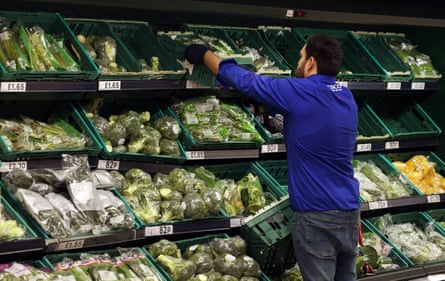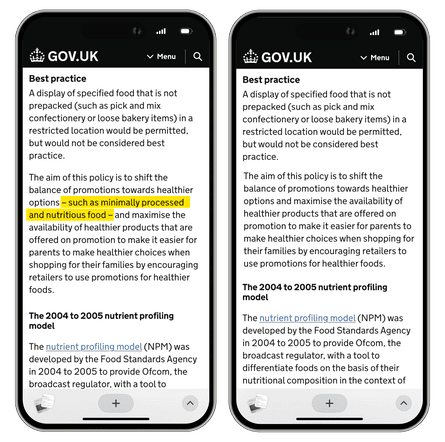Government legal guidance urging retailers in England to offer millions of consumers deals and discounts on minimally processed and nutritious food has been dropped after a lobbying campaign by the world’s biggest ultra-processed food firms, the Guardian can reveal.
Ahead of new regulations banning junk food promotions from October, the Department of Health and Social Care issued advice to thousands of shops, supermarkets, online retailers and other businesses to help them comply with the law.
The guidance said: “The aim of this policy is to shift the balance of promotions towards healthier options – such as minimally processed and nutritious food.” This might include, for example, two-for-one deals, discounts or extra loyalty points on fruit, vegetables, whole grains, fresh meat and fish.
Promotions on minimally processed and nutritious food would be gamechanging, making it more affordable for families and improving the diets of millions.

But the healthy food push was dropped after the Food and Drink Federation, which represents corporations including Nestlé, Mondelēz, Coca-Cola, Mars and Unilever repeatedly demanded the government ditch it.
Now the new regulations coming into force in England still limit the promotion of food and drink that is high in fat, salt or sugar (HFSS), but guidance issued to retailers no longer urges them to switch their deals to minimally processed and nutritious food.
Instead, it simply encourages promotions of “healthier options”. Experts say this is “flawed” advice because many ultra-processed foods still meet the definition of “healthier”, including some energy drinks, crisps, snacks, cereal bars, pizzas, burgers and ice-creams.
The U-turn, revealed for the first time, occurred on 1 June 2023 under Rishi Sunak’s government, the Guardian found. The change remains in the current government’s guidance being issued to retailers ahead of the law change in October.
It came after the FDF waged a campaign to put pressure on the DHSC to rewrite its nutrition policy, lobbying officials to remove the push to minimally processed food in the guidance issued to retailers, according to documents and emails reviewed by the Guardian.
In response to a freedom of information request, the government released a cache of emails between the FDF and the DHSC.
Most of the correspondence was heavily redacted. The government cited section 40(2) of the Freedom of Information Act, “which provides for the protection of personal information”, and section 35(1)(a), “which provides protection for the information that relates to the formulation or development of government policy”.
The emails, sent between October 2022 and April 2023, reveal how the FDF, which represents firms with a combined annual turnover of more than £112bn, lobbied the DHSC to drop the guidance pushing retailers to promote minimally processed food.
Email from [redacted], 2 October 2022
![Email from [redacted], 2 October 2022](https://i.guim.co.uk/img/media/d3f4b0de1ae13b582626a406b5737a763af55f0b/0_0_1631_1506/master/1631.jpg?width=120&dpr=1&s=none&crop=none)
“This is a real bone of contention with the companies … Please can you give me a date when this will be deleted from the guidance?”
“I see the promotions guidance was re-issued on Friday to reflect the new implementation date of the volume-based promotions,” an FDF official wrote in an email to a DHSC official on 2 October 2022. “My understanding was that when the guidance was updated the reference to the aim of the policy being to shift choices to ‘minimal [SIC] processed foods’ would be removed but it’s still there.”
“This is a real bone of contention with the companies,” the FDF official added. “Please can you give me a date when this will be deleted from the guidance?”
Four days later, on 6 October 2022, the FDF official emailed the DHSC official again. “It would be great to understand when this change is going to happen. Clearly the policy and guidance is live and as discussed before, we consider this reads that government policy is that processed foods are inherently unhealthy, not something we agree with or believe the scientific evidence supports.”
Email from [redacted], 6 October 2022
![Email from [redacted], 6 October 2022](https://i.guim.co.uk/img/media/8e7455fbdbaeedf68dff2c1800fda237a0eb12b7/0_0_1631_1755/master/1631.jpg?width=120&dpr=1&s=none&crop=none)
“I had thought we had agreement that this change would happen, and whilst I appreciate you don’t want to keep re-opening guidance documents, this discussion was several months ago now.”
The FDF official said: “I had thought we had agreement that this change would happen, and whilst I appreciate you don’t want to keep re-opening guidance documents, this discussion was several months ago now.”
In an email to DHSC officials on 23 November 2023, an FDF official wrote: “Please do also let us know as soon as possible when you have clarified next steps for removing the reference to ‘minimally processed’ from the promotions guidance – as mentioned on the call, this is a particularly contentious issue for our members.”
Email from [redacted], 23 November 2022
![Email from [redacted], 23 November 2022](https://i.guim.co.uk/img/media/0c249d4cf0bacd5d023aa78e69c1ff91e7841c29/0_0_1631_1755/master/1631.jpg?width=120&dpr=1&s=none&crop=none)
“Please do also let us know as soon as possible when you have clarified next steps for removing the reference to ‘minimally processed’ from the promotions guidance – as mentioned on the call, this is a particularly contentious issue for our members.”
On 3 January 2023, the FDF was told the advice to promote minimally processed food would be deleted from the guidance issued to retailers, the emails show.
Email from [redacted], 3 January 2023
![Email from [redacted], 3 January 2023](https://i.guim.co.uk/img/media/f012fcee28f7b0900562a73f07487df4edc9e2d7/0_0_1631_2484/master/1631.jpg?width=120&dpr=1&s=none&crop=none)
“I can confirm that as part of these changes, we intend to remove the wording ‘such as minimally processed and nutritious food’.”
“We are considering a number of changes to the HFSS promotions implementation guidance as minor points of clarification and will update on these in due course,” an email to an FDF official said. “I can confirm that as part of these changes, we intend to remove the wording ‘such as minimally processed and nutritious food’.”

There is no longer any reference to either term in the current version of the document, which remains live on the government’s website.
Cathy Cliff, campaigns coordinator at the Soil Association, provided the emails to the Guardian after obtaining them under freedom of information laws. “This move to block discounts on healthy foods is clearly one that benefits the profits of UPF manufacturers more than the health of their consumers,” she said.
After the guidance was dropped, the FDF boasted about its lobbying success, hailing the victory in a “key wins” section of its website, the Guardian found.
“The FDF’s engagement with Department of Health and Social Care officials … resulted in the removal of the reference to ‘minimally processed’ in the HFSS promotions guidance.”
The FDF also said it had successfully lobbied to stop ultra-processed food being mentioned in separate legislation in Scotland. “FDF Scotland’s engagement with the Scottish government ensured the prevention of the term ‘ultra-processed food’ [UPF] being used in the good food nation bill.”
The page has since been deleted from the FDF website. It now reads “sorry, page not found”.

Half the average diet of Britons now consists of ultra-processed food (UPF). For some, especially those who are younger, poorer or from disadvantaged areas, a diet comprising as much as 80% UPF is typical.
All food is processed to some degree, and processing can be necessary and beneficial. But UPF is different. It is often high in fat, salt and sugar (HFSS) but also engineered and marketed in ways that cause excess consumption, fuelling the obesity crisis, which costs the NHS more than £11bn a year.
Last month a study found that consuming large amounts of UPF increases the risk of an early death. It is so damaging to health that it is implicated in as many as one in seven of all premature deaths, including at least 17,000 every year in England.
A Department of Health and Social Care spokesperson said: “This change took place under the previous government. This government is committed to tackling obesity and building a healthier Britain.
“We are taking action to end the targeting of junk food adverts to children across TV and online and we have handed local authorities stronger powers to block applications for takeaways near schools. We are also commissioning research to improve the evidence on the health impacts of UPF.”
A Scottish government spokesperson said: “The good food nation bill was framework legislation, the term ‘ultra processed food’ was therefore not omitted, as it was agreed that the bill would not include reference to specific policies.”
An FDF spokesperson said: “FDF regularly engages with government on behalf of food and drink manufacturers, on regulation that underpins nutrition, food safety and food security; as well as on how we play our part in helping people follow healthier diets.
“In the instance cited, we asked the government to phrase their business guidance on new HFSS regulations in a way that was consistent with that legislation. We were concerned that references to processing in the guidance, which was not covered in the legislation, would cause confusion.”

 3 months ago
40
3 months ago
40

















































